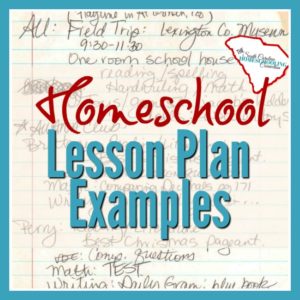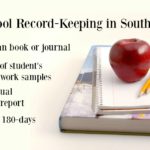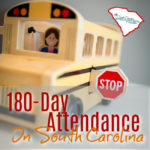What sort of grade level guidelines and standards should homeschoolers follow? As you take on the responsibility of educating our own kids, some of you are wondering what you should be doing at each grade level. How do you know if you’re “keeping up with the schools” or “falling behind“?
There are not any specific objectives in homeschool law. We have a few basic subjects: Reading/Writing, Math, Science and Social Studies. But, what do you need to cover in each subject? And when? What grade level? How do you know if you’re covering all the right stuff?
Grade Level Guidelines
In education-speak, the order of the topics and objectives is called scope and sequence. You are not required to follow the state’s scope and sequence. You can pick and choose any curriculum that interests you or suits your style. Bear in mind that anything you choose is a guide, not the master. If your student’s resist the pace—by getting bored or frustrated, then that’s a clue that you need to do something different.
Some people like to use the state standards as a guide. If your child might be going back to public school at some point, it might be beneficial to stay on track with the state or national standards. Other people like to use the national standards (which also called common core standards). If you might be moving out of state, you might find the national standards useful.
State and National guidelines are divided by subject. The subject includes what skills and topics students should master at each grade level.
- SC Department of Education Website State Standards
- SC Education oversight committee’s Friendly Standards
- National Standards or common core for all states. Printable Checklists for Kindergarten-6th grade
- International Standards
Many homeschool curriculums cover topics and objectives in different order than the state or national standards. Many homeschoolers intentionally avoid and resist programs that are aligned with common core. If you’re looking to see what’s age appropriate for your child, a guide can help determine if you’re pushing to hard or lagging behind.
- What Your 1st, 2nd, 3rd, 4th, 5th Grader Needs to Know series. Check your library to see if they have it.
- Ruth Beechick’s 3 R’s is a short, practical overview of K-3rd grade skills in Reading, Writing, & Math.
- Kathryn Stout’s Design-A-Study guides by subject: History Plus, Science Scope, Maximum Math, Comprehensive Composition, Natural Speller
- Classical Education outline of skills development: Trivium Pursuit
What is the right stuff anyway?
Also consider that no one knows what the future will look like–what content is necessary knowledge to succeed in the future? Jobs that our kids will do, likely do not even exist yet. So, most curriculum is based on the past–what people needed to know for success then. No one really knows what is the essential body of knowledge that needs to be covered.
And just because you cover it, doesn’t mean the learner will retain it. Every education setting has gaps. This is usually a huge relief when homeschool parents realize there will be gaps anyway. Because we all worry about whatever we don’t know that we don’t know.
It’s more important to learn how to learn—and also be willing to unlearn and relearn what you thought you knew already.
Think of it like feeding your kids a nutritional diet. There are guidelines and menu planners out there. But, only you know what your kids will actually eat. You have to modify to fit them. You are the resident expert who knows that.
You have your children’s best interest at heart to see them grow and mature. You’re the expert who knows your child best. Don’t worry about those learning gaps or what you don’t know that you don’t know.
Humans are infinitely curious. Fuel your child’s curiosity. Curiosity will guide you from there!
Now, let’s look at some lesson plan examples
to keep track of what you’re learning/teaching:




 3 Reasons You Should Keep Good Homeschool Records
3 Reasons You Should Keep Good Homeschool Records Homeschool Lingo in South Carolina
Homeschool Lingo in South Carolina Transcript Assistance Service
Transcript Assistance Service What Does 180 Day Requirement Mean?
What Does 180 Day Requirement Mean?




[…] to make that happen. We look to the so-called “experts” in education who have set guidelines and standards for measuring that success so we can use that as an equivalent […]